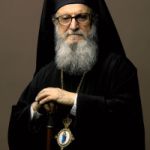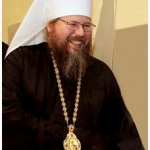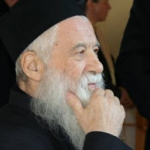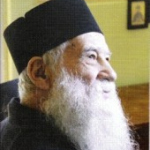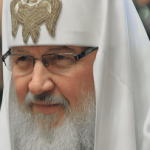
Deprecated: trim(): Passing null to parameter #1 ($string) of type string is deprecated in /home/aoiusa/public_html/wp-content/plugins/sexybookmarks/public.php on line 388
Deprecated: trim(): Passing null to parameter #1 ($string) of type string is deprecated in /home/aoiusa/public_html/wp-content/plugins/sexybookmarks/public.php on line 394
Deprecated: trim(): Passing null to parameter #1 ($string) of type string is deprecated in /home/aoiusa/public_html/wp-content/plugins/sexybookmarks/public.php on line 400
Source: Department for External Church Relations of the Russian Orthodox Church
Beloved in the Lord archpastors,
all-honourable presbyters and deacons,
God-loving monks and nuns, dear brothers and sisters!
From my heart filled with gratitude towards God, I proclaim to all of you the great and saving news:
CHRIST IS RISEN!
With each year the Church testifies through this Paschal exclamation to the event of universal significance which happened almost two thousand years ago. It was then that early in the morning the myrrh-bearing women came to the burial site of their Teacher and saw that the tomb was empty. The divine power of Christ had triumphed over the law of death. He had risen, testifying to all of humanity that death was not the end of life, that death was overcome by the power of God.
Christ’s resurrection, in being a unique event in world history, became by God’s intention the beginning too of our own personal resurrection. It was precisely for this that the Saviour came into the world, suffered, was crucified and rose from the tomb in order that each person had the chance to go through the experience of resurrection from the dead, and not in the figurative but direct meaning of this world. St. Paul speaks clearly of this: ‘God… will also raise us up by his own power’ (1 Cor 6: 14).
That is why the feast of Pascha is the feast of the victory of life over death, for through the resurrection of Christ the Saviour resurrection from the dead has been granted to us all. And whatever difficult circumstances we may endure in our earthly life, whatever tribulations may be our lot, whatever fears people may try to instill in us – for they possess no spiritual power to foresee the future – our perception of the world ought to be calm and joyous, for Christ has risen.
The feast of Pascha in Holy Russia has always been great and radiant. And now in recent decades it has again returned to many homes and families. It is now also celebrated in those places where previously there had been no Paschal greeting: in hospitals, prisons, in the army and navy, and even in space. May God grant that beyond the external transformations taking part now in the countries of the Russian world there may be accomplished the genuine rebirth of human souls, that the joy of Christ’s resurrection may fill the hearts of each one of us, that the light of divine love may warm not only our families and friends but also people deprived of the chance of being in church, the elderly, sick and lonely.
Through Christ’s resurrection the believer acquires the chance of communicating with the power of grace sent down from above so that he may live in truth and according to God’s commandments: to be good and merciful, honest and a well-wisher in his relations with people, to be capable of sharing with them both joy and grief.
This Christian attitude towards our neighbours includes both concern for one’s country, for one’s people, and for one’s family and home. In preaching the priority of eternal spiritual values, the Church calls upon her children to adopt a tactful attitude towards the temporal yet real values of the world created by God: towards the environment and towards our rich cultural inheritance which has been made over centuries by our predecessors. To be guardians of the spiritual treasures and traditions of Orthodoxy means to transform oneself and one’s inner world actively, as well as to maintain the beauty and harmony of the world which surrounds us and to build them up in those places where they have been destroyed by the ill will of people. This is the vocation and responsibility of the Christian.
The Lord does not demand of us endeavours that our beyond our strength. He appeals to the soul of each individual and again and again calls upon us: ‘Come unto me, all ye that labour and are heavy laden, and I will give you rest. Take my yoke upon you, and learn of me; for I am meek and lowly in heart: and ye shall find rest unto your souls. For my yoke is easy, and my burden is light’ (Mt 11: 28-30). In order to feel and understand how good and light is the burden that the Lord lays upon us, we must learn how to do good to our neighbours and those far from us. In this learning process it is only the first steps that are difficult: to stop in time and not to answer rudeness with rudeness, evil with evil, falsehood with falsehood, condemnation with condemnation. And then at least to feel gratification as a result of a correct and honest act which is beneficial to the other person, whether in the family, at work, in the parish or simply when speaking to other people and acquaintances. This sense of gratification can then turn into a joyful and optimistic spiritual condition if good deeds carried out not for the sake of gain but from a pure heart become a part of our lives. It is only then that we will feel the changes for the better in our public life when we become aware of the presence of the indestructible link between the good we have done and the well-being of society.
The evangelical motivation of our acts both in our private and professional and public sphere is capable of changing radically both ourselves and the world we live in.
‘May God arise and his enemies be scattered!’ – we exclaim on that light-bearing night. May God arise in our hearts and may the falsehood, enmity, evil, discord and all divisions in our life be scattered!
From the bottom of my heart I congratulate all of you, my dear ones, on the feast of Holy Pascha. May the aid and blessing of the Lord who has truly risen accompany each of us in our further labours for the glory of the Church, the well-being of the country in which we live, and for the good of our neighbours and those far from us. Amen.
PATRIARCH OF MOSCOW AND ALL RUSSIA
Moscow
Pascha
